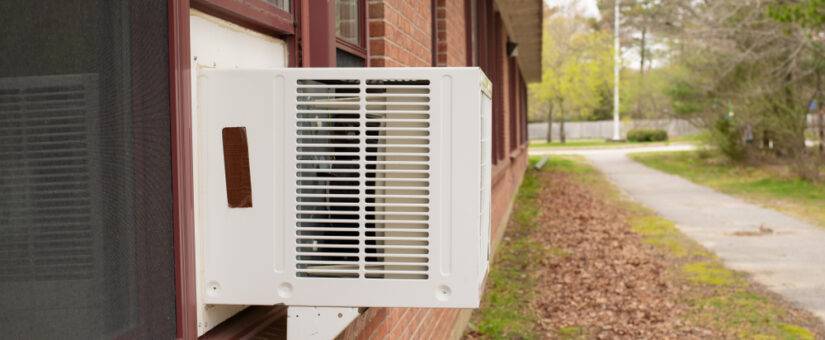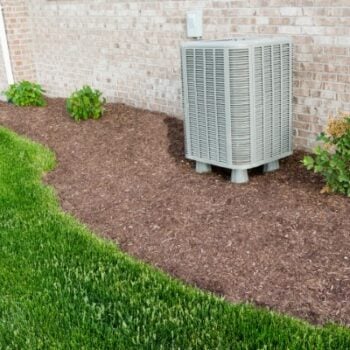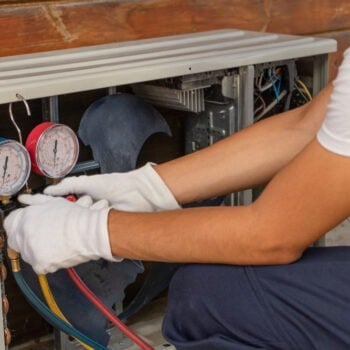
- On July 27, 2022
In Phoenix and most parts of the US, the benefits of air conditioners make AC units for homes a must-have. Air conditioners help you control temperature, quality of air, and humidity in your home. However, there are various types of air conditioners on the market. In a market full of different air conditioners, selecting the best home AC can be overwhelming as you may not know whether to install a central, window, or mini-split air conditioner. But don’t worry, Howard Air & Plumbing is here to help you select the right home AC or repair a faulty air conditioner.
Let’s look at the types of air conditioners you should be aware of when shopping for a new unit.
Types Of Central Air Conditioners
A central air conditioner has a large outdoor unit placed on concrete slabs. There are two types of central air conditioners:
- Packaged Central Air Conditioners
- Split-System Central Air Conditioners
The main difference between the two air conditioners is the outdoor units. Howard Air & Plumbing helps you choose the right one depending on the prevailing climate in your local area.
Packaged Central Air Conditioners
The Packaged Central Air Conditioners has a single outdoor unit that house the compressor, condenser, and evaporator. When you buy a Packaged Central Air Conditioner, we install it on a slab next to your home’s foundation and connect the interior.
Split-System Central Air Conditioners
Unlike Packaged Central Air Conditioners, the evaporator unit in the Split-System Central Air Conditioner is installed inside your house. The compressor and condenser are housed in the outdoor unit. If you require a furnace, it is installed together with the evaporator inside the house.
Benefits of Central Air Conditioners
Central air conditioners offer a range of benefits to your home. The benefits include;
- You Only Need One Unit: A single central air conditioner cools the entire house. You do not need to install a conditioner for each room, which helps you save space. Besides, you only maintain a single unit rather than multiple window units.
- Controls Humidity: When installed and maintained correctly, central air conditioners also control humidity. A central air conditioner considerably reduces energy consumption as you do not need to install a humidifier.
- Improves the Value of Your Home: Installing a central air conditioner attracts buyers since many do not like the inconveniences of fixing one before they settle. The value of your property appreciates when more home buyers want it.
What To Know Before Installing A Central Air Conditioner
Like any other major appliance, you need to understand a few things before settling for the Central AC units for homes. Understanding the downsides and benefits of a Central AC for your home can help you weigh your options and select the best air conditioner.
The main downside of the central AC is the cost. The cost of installing a central AC ranges between $3,801 – $7,595, depending on the size and installation company.
You should also understand the right AC size for your home and assess your home air conditioning needs before the installation. This assessment helps you avoid installing an AC that is too big or too small for your home. If you live in the Phoenix area, you can schedule an appointment with our technicians.
Further, you also need to understand that fixing central AC is a major home uplift. If you are a tenant, you may require your landlord’s approval.
Mini-Split/Ductless Air Conditioners
A mini-split or ductless AC offers relief to homeowners that have no ductwork. The mini-split AC comes with a single outdoor unit that feeds different evaporators in the interior.
Benefits Of Mini-Split Air Conditioners
- Flexibility: the mini-split AC allows you to install up to four evaporators in different rooms. Different evaporators make it possible to set a different temperature in each room.
- Lowers your energy bills: since you do not need ductwork, mini-split AC helps you cut your energy consumption.
What To Know Before Installing A Ductless Air Conditioner
Ductless air conditioners are considered easy to install. However, their overall cost of installation and maintenance may exceed the central AC. The average cost of installing a mini-split AC ranges between $2,000-$14,500. Installing an evaporator for each room makes it even more expensive.
Heat Pumps
Heat pumps and air conditioners have some notable similarities. They come in two parts and have outdoor and indoor components. However, the primary difference is that a heat pump can heat your home as well as cool it.
Benefits of Heat Pumps
Ideal for Moderate Climates: heat pumps provide sufficient cooling and heating in areas with a moderate climate. People who live in areas where the climate does not vary widely can alternate between cooling and heating their homes using heat pumps. However, a heat pump may not work for you if you live in a place like Phoenix, which experiences extreme temperature changes throughout its seasons.
What to Know Before Installing a Heat Pump
Even when you live in an area that has a moderate climate, there are a few things that you need to know before choosing the heat pump over home AC units:
- Heat pumps are more expensive to purchase and maintain when compared to air conditioners.
- Heat pumps lose their heating efficiency when temperatures fall below 40 degrees Fahrenheit.
- Heat pumps have shorter lifespans as they run all year round.
How to Choose the Right Type of AC System
Now that we have reviewed the different types of air conditioners, let’s examine what you need to consider when purchasing AC units for homes.
Budget
When selecting the best air conditioning system that fits your budget, you need to consider the purchase and maintenance costs. While the purchase cost for some air conditioners is low, the maintenance cost may be higher due to their lack of quality and efficiency.
The Size of Your Home
Home air conditioners differ in home-cooling capacity. The most common and effective types of systems are central split and central packaged systems. When selecting AC systems for homes, consider the size of your home in square feet. Experts recommend 20 BTUs per square foot that require cooling. Before deciding on the type and size of the system for your home, consult with a licensed contractor to properly size and estimate the scope of work needed.
Ductless Mini-Split Systems
Ductless air conditioning systems are rising in popularity, efficiency, and quality in recent years. Ductless systems are most common for cooling smaller areas like a garage workshop, home office, or gym. Ductless mini split systems typically operate with a smaller outside condenser, connected to a wall or ceiling-mounted air handler, and can efficiently cool up to 1,000 sq. ft. with a single air handler, depending on the size and design.
With no ductwork needed, this will save you space, time, and money. The condenser is installed on a concrete slab outside of the home and is connected to the inside portion of the system with electrical and cool moving refrigerant through line sets.
Another benefit to having a ductless mini-split system is the multiport capability that allows the system to have multiple air handlers to cool more rooms or areas in the home. The more space you are cooling, the larger the outdoor condenser you will need, this will raise the overall price of the project.
Window Air Conditioners
Many homes in the Phoenix area use the window air conditioner. Here are some benefits that make the window air conditioner a preferred AC.
Benefits Of Window Air Conditioners
- Affordability: the cost of a window air conditioner can go as low as $150.
- Easy to clean: you can easily remove the different parts, clean them, and replace them.
- Energy efficiency: the window air conditioners are small in size and use less energy when compared to the central AC.
What To Know Before Installing A Window Air Conditioner
The window air conditioner may not function efficiently in larger homes. If you have bigger rooms or increase the number of your rooms, you may have to add more window air conditioners. Eventually, it may not make economic sense to have window air conditioners.
The extreme summer temperatures in Phoenix make AC systems for homes essential equipment for homeowners. When you install the right air conditioning system, you drastically improve the quality of life for those living in your home.
Choosing the best AC system can be a daunting task. We will look at heat pumps, ductless mini-split systems, and portable air conditioners in this post to better explain how each work and help you make sense of which one will be right for you and your home.
Learn More About the Best Air Conditioners for Your Arizona Home
There are several air conditioners available on the market. Each air conditioner has its benefits and downsides. When looking for ac units for homes, you should understand the pros and cons, but your air conditioner installer should help you select the best option for your home AC. Depending on your air conditioning needs, budget, and home size, you can install a central, mini-split, or window air conditioner.
At Howard Air & Plumbing, we understand that each homeowner or tenant has unique needs for ac units for homes. Our years of experience in air conditioner installation have helped us appreciate that not all clients require a central or a window AC. We recommend that our clients schedule appointments with our technicians before settling on a specific AC. To get the right air conditioner for your home or have an existing one repaired, schedule an appointment today or call 480-508-9866.
Schedule Appointment
Featured Image: Liz Tracy Photography / Shutterstock


















0 Comments